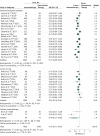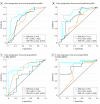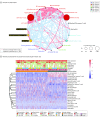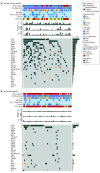Association of Survival and Immune-Related Biomarkers With Immunotherapy in Patients With Non-Small Cell Lung Cancer: A Meta-analysis and Individual Patient-Level Analysis
- PMID: 31290993
- PMCID: PMC6625073
- DOI: 10.1001/jamanetworkopen.2019.6879
Association of Survival and Immune-Related Biomarkers With Immunotherapy in Patients With Non-Small Cell Lung Cancer: A Meta-analysis and Individual Patient-Level Analysis
Abstract
Importance: The beneficial role of immunotherapy and the clinical relevance of current biomarkers in non-small cell lung cancer (NSCLC) remain inconclusive; thus, appropriate strategies and reliable predictors need further definition.
Objectives: To evaluate the association of clinical outcomes with immune checkpoint inhibitors, tumor vaccines, and cellular immunotherapy in patients with advanced NSCLC and to explore appropriate strategies, candidates, and predictors.
Data sources: The PubMed, EMBASE, and Cochrane Central Register of Controlled Trials databases were searched from inception to June 2018, using relevant search keywords and Medical Subject Headings (MeSH) terms, including tumor vaccine, cellular immunotherapy, immune checkpoint inhibitor, cytotoxic T-lymphocyte-associated protein 4, programmed death-ligand 1, programmed death receptor 1, and non-small cell lung carcinoma. Systematic reviews, meta-analyses, references, and conference proceedings were manually searched.
Study selection: English-language randomized clinical trials with available data that measured overall survival (OS), progression-free survival (PFS), or objective response rate comparing immune checkpoint inhibitors, tumor vaccines, or cellular immunotherapy with conventional therapy for patients with advanced or metastatic NSCLC were included. Thirty-one immunotherapy randomized clinical trials were included, and multicohort data included next-generation sequencing data from patients with advanced NCSLC.
Data extraction and synthesis: Hazard ratios and 95% CIs were pooled to estimate the survival increases in OS and PFS. Dichotomous data, such as object response rate data, were analyzed using the risk ratio. Mantel-Haenszel random-effects model was used. I2 was used to assess the heterogeneity between trials; an I2 value exceeding 50% indicated the existence of substantial heterogeneity. Analyses took place from February 1, 2018, to August 31, 2018.
Main outcomes and measures: Primary outcomes were OS and PFS.
Results: In total, 14 395 patients (9500 [66.0%] men) were included in the meta-analysis, and 1833 patients (mean [SD], 65.2 [9.9] years; 1063 [58.0%] men) were included in the individual patient-level study. Compared with conventional therapy, immunotherapy was associated with significantly longer OS (hazard ratio, 0.76; 95% CI, 0.71-0.82; P < .001) and PFS (hazard ratio, 0.76; 95% CI, 0.70-0.83; P < .001). The best checkpoint blockade strategy was first-line pembrolizumab with platinum-based chemotherapy. The combined predictive utility of programmed cell death ligand 1 (PD-L1) expression and tumor mutation burden (TMB) was associated with predictive prognosis (whole-exome sequencing: 1-year PFS area under the receiver operating characteristic curve [AUC], 0.829; 3-year PFS AUC, 0.839; targeted next-generation sequencing: 1-year PFS AUC, 0.826; 3-year PFS AUC, 0.948). Moreover, the addition of CD8+ T-cell tumor-infiltrating lymphocytes was associated with improved prognosis predictions for OS (3-year OS AUC, 0.659; 5-year OS AUC, 0.665). RYR1 or MGAM mutations were significantly associated with concomitantly increased durable clinical benefits (RYR1: durable clinical benefit [DCB], 12 of 51 patients [24%]; no durable benefit [NDB], 2 of 55 patients [4%]; P < .001; MGAM: DCB, 12 of 51 patients [24%]; NDB, 0 patients; P < .001), a higher TMB (RYRI: high TMB, 12 of 53 patients [23%]; low TMB, 2 of 53 patients [38%]; P < .001; MGAM: high TMB, 9 of 53 patients [17%]; low TMB, 0 patients; P < .001), and higher PD-L1 expression (RYRI: high PD-L1 expression, 8 of 30 patients [27%]; low PD-L1 expression, 6 of 85 [7.1%]; P < .001; MGAM: high PD-L1 expression, 6 of 30 patients [20%]; low PD-L1 expression, 5 of 85 patients [6%]; P < .001).
Conclusions and relevance: Immunotherapies showed promising clinical outcomes for patients with NSCLC. Pembrolizumab with platinum-based chemotherapy was found to be the most appropriate first-line immune checkpoint inhibitor regimen for advanced NSCLC, and the combined use of PD-L1 expression and TMB was found to be a promising biomarker to evaluate patients' survival and response to precision immunotherapy. The further combination of CD8+ T-cell tumor-infiltrating lymphocytes, PD-L1 expression, and TMB was associated with reliable prognosis. The predictive value of that combination needs to be prospectively validated in large-scale studies.
Conflict of interest statement
Figures





References
-
- Horn L, Spigel DR, Vokes EE, et al. . Nivolumab versus docetaxel in previously treated patients with advanced non-small-cell lung cancer: two-year outcomes from two randomized, open-label, phase III trials (CheckMate 017 and CheckMate 057). J Clin Oncol. 2017;35(35):3924-3933. doi:10.1200/JCO.2017.74.3062 - DOI - PMC - PubMed
-
- Quoix E, Lena H, Losonczy G, et al. . TG4010 immunotherapy and first-line chemotherapy for advanced non-small-cell lung cancer (TIME): results from the phase 2b part of a randomised, double-blind, placebo-controlled, phase 2b/3 trial. Lancet Oncol. 2016;17(2):212-223. doi:10.1016/S1470-2045(15)00483-0 - DOI - PubMed
Publication types
MeSH terms
Substances
LinkOut - more resources
Full Text Sources
Medical
Research Materials

